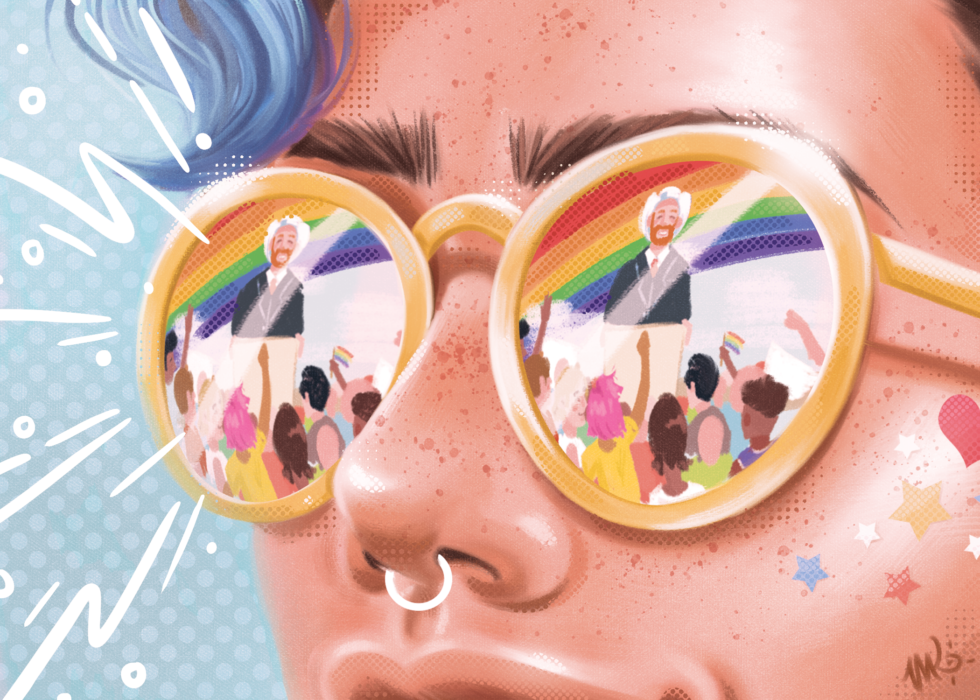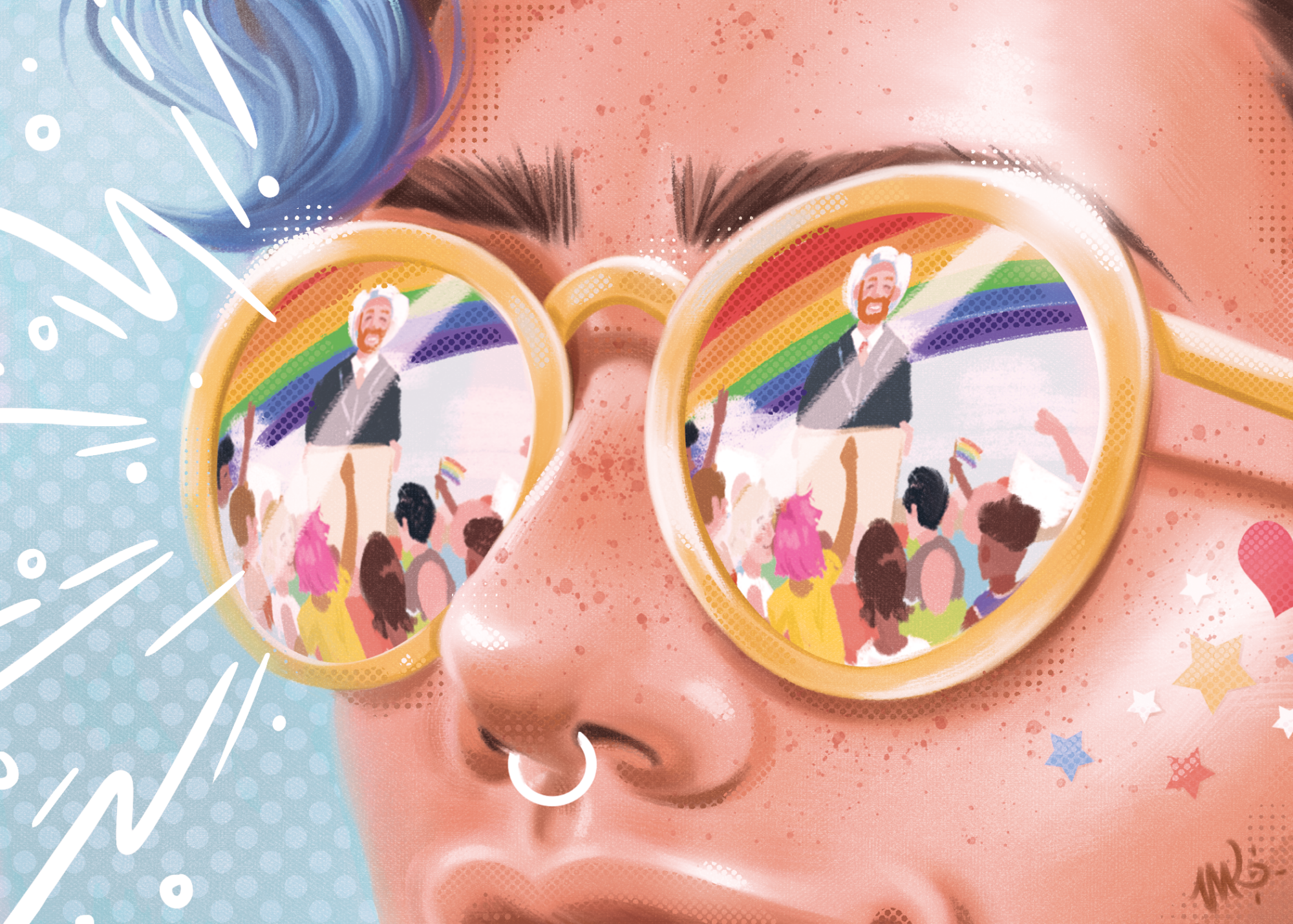
When Lakshan Lingam came out as queer to his Utah family in April, most of them were not accepting of his sexual orientation. One family member, Lingam said, told him he shouldn’t have children, because kids should be raised by a mother. The experience reinforced Lingam’s impression that being anything but straight in Utah is inexcusable.
“Growing up in Provo, I knew I was gay for a really long time, but I was dead set in not tapping into it,” Lingam, a student at the University of Utah, said. “The queer culture growing up was not very positive. I didn’t have anyone to look to when I was growing up.”
Just a month later, though, an unlikely role model has emerged close to home. Nathan Ivie, a commissioner in heavily conservative Utah County who dons a cowboy hat and trains horses, revealed in a May 22 video on Facebook that he is gay, making him the first openly gay Republican politician in Utah.
In the video, Ivie is open about struggles with his sexual orientation, including a failed suicide attempt when he was 22. Eighteen years later, however, Ivie’s announcement has been met with relative acceptance and encouragement.
“Some people will not understand or accept what I’ve announced today,” Ivie says in the video. “I get it. I hope time will bring those people to a place of understanding, but I’ve also learned that most people in my life are far more understanding than I ever thought possible.”
Ivie’s and Lingam’s stories portray the complicated LGBTQ experience in Utah. Theirs are stories of pain, rejection, and conflict, but also of community, compassion, and hope. Ivie’s declaration comes at a time when Utah is grappling with legal and cultural equality for LGBTQ people.
Many in Utah’s LGBTQ community say Ivie championed equal rights even before he came out publicly. He was instrumental, for example, in helping Encircle Utah, a Provo-based nonprofit that helps LGBTQ youth, march in the city’s 2017 Freedom Parade. Ivie threatened to cut off the county’s $113,000 in funding if the parade didn’t include LGBTQ groups.
Such actions are uncommon, particularly in Utah’s ultra-conservative towns outside the Wasatch Front. While the state forbids housing and employment discrimination based on sexual orientation, a recent bill to ban the practice of conversion therapy failed in the state legislature. Despite Ivie’s support in 2017, the city of Provo a year later denied the applications of all five LGBTQ organizations that asked to march in the Freedom Parade.
Additionally, while Utah has codified nondiscrimination into law, The Church of Jesus Christ of Latter-day Saints’ stance on gay relationships facilitates an unwelcoming atmosphere. Church members are instructed to accept same-sex attraction but condemn gay relationships. In 2015, the church announced that children raised in gay households could not be baptized, but it reversed that position in April.
The changing legal and social landscape can manifest in inexplicit forms of discrimination for LGBTQ people. Encircle Utah’s executive director Stephenie Larsen said, for instance, that a landlord may not be able to turn away an LGBTQ renter, but other tenants can make them feel unwelcome in their own home and force them out.
“Until you change people’s minds,” Larsen said, “they aren’t really protected.”
Social and familial rejection pose yet another risk, particularly for LGBTQ youth. In Utah, youth suicide rates quadrupled between 2007 and 2017; suicide is now the leading cause of death for kids ages 10 to 17 in the state, according to the Centers for Disease Control and Prevention.
Larsen said Ivie’s statement will help at-risk LGBTQ youth in Utah. Larsen, who is Mormon, previously lobbied against gay-rights legislation in Washington, D.C., but changed her track after working with John Williams, a Mormon gay activist. She sees Ivie as an important role model for Mormon youth, especially. Many Latter-day Saints have their lives laid out for them as teens: seminary, a mission, a spouse and family. Realizing you don’t fit that mold, Larsen said, can be a traumatic experience.
“When you’re 12 and … all of a sudden you realize that may never be my life, a lot of these kids don’t know who they are anymore,” Larsen said. “Having people like Nathan Ivie says you can be very successful, you can thrive in our community, and you can be a part of our community.”
Troy Williams, director of Equality Utah, said Ivie’s coming out might have lasting political implications.
“How else would the Republican party change without people on the inside?” asked Williams. “That’s how you create change. You can abandon it and let it do its damage, or you can help transform it from within.”
Longtime LGBTQ activist and political operative Weston Clark, however, had a more measured response.
“I don’t know that [Ivie’s coming out] says a lot,” he said. Whether the community reelects him could be the true bellwether, Clark said. “That’s gonna be when we find out what’s really being said.”
Whether or not the broader community embraces Ivie, Clark still thinks the Utah politician’s announcement will save lives.
“There are many young people who don’t feel comfortable enough to come out because they are deeply embedded in the Utah Republican and LDS communities,” he said. “Seeing one of their own come out in a public way is huge in sending a message to those who need it.”
Lingam, for one, is moved by Ivie’s story. “It’s empowering to know that there are other people in high-level positions that we can aspire to be,” he said.

